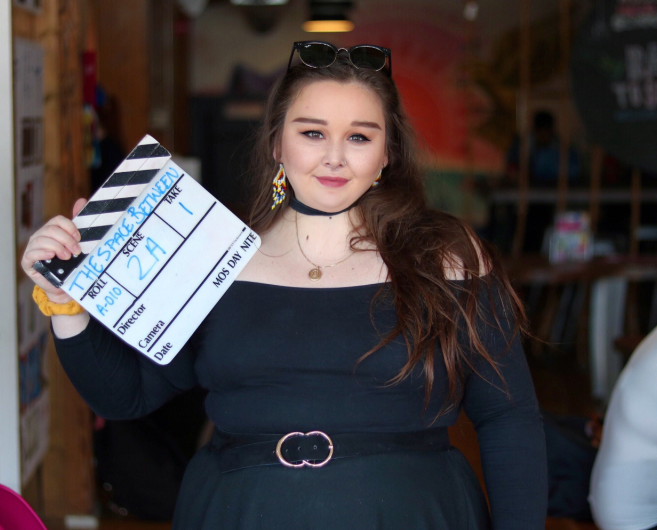
Connecting Indigenous communities with opportunities. That’s what Karly Cywink, the Indigenous multidisciplinary artist behind a new PRESTO card recently distributed to two Indigenous services and employment organizations in Toronto wants to evoke with her beautiful design, inspired by traditional Indigenous culture.
The card is symbolic of a philanthropic initiative by Aecon, in partnership with Metrolinx, wherein 500 preloaded PRESTO cards were distributed to clients of Miziwe Biik Aboriginal Employment and Training’s 12-week work placement program, and the Native Canadian Centre of Toronto’s COVID-19 Support and Youth Housing, Employment & Training programs to provide public transit access within the Greater Golden Horseshoe.

Enter Karly, a recent university graduate and talented artist who connected her Indigenous roots to the stunning metropolitan Toronto skyline to develop this unique PRESTO card design.
In a recent interview with Aecon’s Corporate Affairs team, Karly spoke about her journey as an artist, the inspiration behind the design and how she plans on continuing to advance her career.
What inspired you to get into the arts?
Karly: My path to becoming an artist began when I was only 12 years old. I started a YouTube channel to post short skits and video edits of my favourite shows and movies. In high school, my love for digital art grew as I sparked an interest in camera directing and post-production. This love for digital art ultimately forged the path I chose to embark on in university – I studied Radio and Television Arts (RTA) Media Production and honed my unique design style while enriching my love for documentary filmmaking and esports production. Documentary filmmaking genuinely inspires me as I am always looking for ways to uplift the often-overlooked voices, including my own, so this medium provides a method and freedom of expression that resonates with me.
What was your inspiration for the PRESTO card design?
Karly: The main inspiration behind this design is Indigenous beadwork, patterns, and the vibrant colours of regalia, or jewelry that is worn at Pow Wows. I find these patterns extremely beautiful and constantly evolving. By incorporating the sky, where I draw lots of inspiration from, I felt it was only fitting to include the skyline of Toronto, as nothing says Toronto more than that. In this design, the Toronto skyline combined with traditional patterns that speak to Indigenous art is a perfect illustration to symbolize this initiative.
How did you conceptualize the design?
Karly: With the Toronto skyline, I wanted the Indigenous patterns to be where the eye is drawn. I started by creating the flowers, then incorporated them into a rough sketch. Our eyes naturally flow left to right, so it was important to make it appear like the flowers bloomed left to right and continued to grow indefinitely.
What is your favourite element of the card design?
Karly: I love each element individually, however, I don’t think that the individual components could stand alone. It is the combination of features that tells the story and evokes the feeling of harmony. If I had to choose one part of the design, the blooming flower pattern would be my favourite – it’s the standout element and the piece that means the most to me.
What is the most interesting or impactful part of this opportunity?
Karly: I have created different forms of art since I was young and worked on projects for people to view at their leisure, whether for a school project or on my own time. However, my art has never been exposed to as many people as it will be through this PRESTO card. So, I think that’s the most impactful part of this opportunity for me. Specifically, people that will resonate with the design and find elements such as beadwork patterns familiar. Creating a piece of art that will share my culture is an source of pride for me – making this project near and dear to my heart and ultimately essential for our Indigenous community here in Toronto and aspiring artists alike.
Professionally, what is your goal?
Karly: As an artist, my goal is simple but powerful – to make people feel something and evoke emotions when they look at my art, whether it’s a sense of belonging, relatability, feeling heard or even inspired. My dream projects range from creating an Indigenous documentary series, to directing esports live events, publishing an illustrated storybook, and developing a video game. I want to feel happy with what I do. I create things because it brings me joy, and there is nothing greater than sharing that joy with people.
Miziwe Biik Aboriginal Employment and Training was created in 1991 to meet the unique training and employment needs of Indigenous Peoples. Miziwe Biik provides the Greater Toronto Area’s Indigenous community with training initiatives and employment services.
Native Canadian Centre of Toronto (NCCT) has been a leader in building a healthy and vibrant urban Indigenous community in Toronto for over 50 years. Serving over 2,000 clients per year, NCCT tirelessly works to provide culturally centred services and programs to increase the economic, social, cultural and health outcomes of Indigenous Peoples.
Metrolinx’s operating area transverses the traditional territory of three Indigenous cultural groups and is covered by 19 treaties held between Canada and several First Nations. As part of their ongoing work Metrolinx regularly engages with 13 Indigenous Nations or political bodies. Metrolinx is committed to working closely with Indigenous Nations, Peoples and organizations and building strong meaningful relationships.
Aecon is a Canadian leader in construction and infrastructure development and is dedicated to fulfilling its commitment to building and fostering inclusive and collaborative relationships with Indigenous communities across Canada. Aecon builds relationships with Indigenous communities on a foundation of trust, respect, and understanding through our inclusive approach which focuses on apprenticeships, employment, training, sustainability and business development. For further information, please visit www.aecon.com/indigenousaffairs.